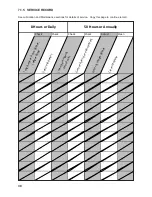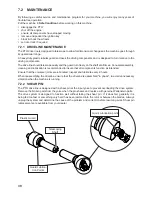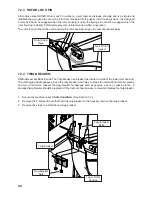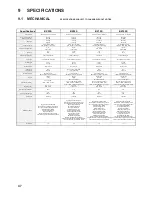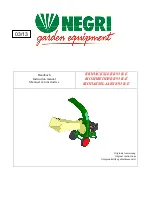
33
MAINTENANCE SAFETY
•
Good maintenance is your responsibility.
Poor maintenance is an invitation to trouble.
•
Follow good shop practices.
•
Keep service area clean and dry.
•
Be sure electrical outlets and tools are
properly grounded.
•
Use adequate light for the job at hand.
•
Make sure there is plenty of ventilation. Never
operate the engine of the towing vehicle in
a closed building. The exhaust fumes may
cause asphyxiation.
•
Put the machine in
Safe Condition
:
•
disengage the PTO
•
shut off the engine
•
ensure all components have stopped
moving
•
remove and pocket the ignition key
•
block & chock the wheels
•
set rotor lock if required
•
Never work under equipment unless it is blocked
securely.
•
Always use personal protection devices such
as eye, hand and hearing protectors, when
performing any service or maintenance work.
Use heavy gloves when handling sharp
components.
•
Where replacement parts are necessary
for periodic maintenance and servicing,
genuine factory replacement parts must be
used to restore your equipment to original
specifications. The manufacturer will not be
responsible for injuries or damages caused by
use of unapproved parts and/or accessories.
•
A fire extinguisher and first aid kit should
be kept readily accessible while performing
maintenance on this equipment.
•
Periodically tighten all bolts, nuts and screws
and check that all electrical and fuel connections
are properly secured to ensure unit is in a
Safe
Condition
.
•
When completing a maintenance or service
function, make sure all safety shields and
devices are installed before placing unit in
service.
7 SERVICE AND MAINTENANCE
7�1 SERVICE
By following a careful service and maintenance
program for your machine, you will enjoy many
years or trouble-free operation.
7�1�1 FLUIDS AND LUBRICANTS
1� Grease:
Use an SAE multipurpose high
temperature grease with extreme pressure
(EP) performance. Also acceptable is an SAE
multipurpose lithium base grease.
2� Storing Lubricants:
Your machine can operate
at top efficiency only if clean lubricants are used.
Use clean containers to handle all lubricants.
Store them in an area protected from dust
moisture and other contaminants.
7�1�2 GREASING
Use the Maintenance Checklist provided to keep a
record of all scheduled maintenance.
1. Use a hand-held grease gun for all greasing.
2. Wipe grease fitting with a clean cloth before
greasing, to avoid injecting dirt and grit.
3. Replace and repair broken fittings immediately.
4. If fittings will not take grease, remove and clean
thoroughly. Also clean lubricant passageway.
Replace fittings if necessary.
7�1�3 SERVICING INTERVALS
See service record and service illustration for service
interval information. The period recommended is
based on normal operating conditions. Severe
or unusual conditions may require more frequent
lubrication or oil changes.
IMPORTANT
Do Not over grease.
Look for this label on
your machine, it indicates
a grease point and the
number of hours between
greasing.




















